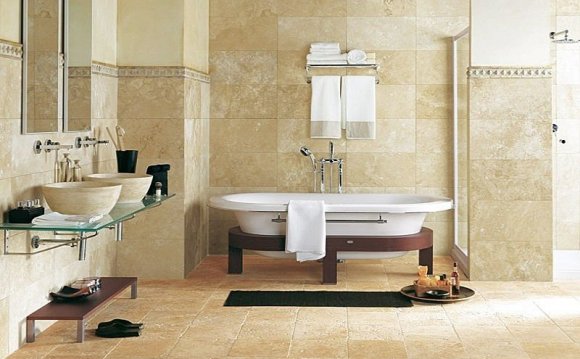
For property owners who like to allow nature drive their designs, stone may be the path to take. It's often the priciest floor option, but natural rock tile transforms an ordinary restroom into a deluxe getaway. Rock tile gains rich character in the long run and can last for decades. The area are cold and slippery, but radiant in-floor heat and slip-minimizing finishes will deal with these issues.
Granite. An igneous stone, granite is extremely difficult and will come in a number of colors and habits.
Limestone. A sedimentary rock that's smooth and obtainable in whites and neutrals.
Marble. A metamorphic stone containing crystallized limestone which have a luxurious area rich with veining and crystals.
Slate. Made up of quartz, chlorite, mica, and calcite, record is very durable and will come in different colors.
Travertine. Created in underground rivers and channels, smooth and porous travertine will come in earthy tones.
When choosing the right rock tile for your restroom flooring, look at the next facets:
Finish. Surface textures and finishes vary based on which kind of stone you decide on. Generally speaking, polished finishes appear sleeker but can be slippery underfoot. A honed or matte finish offers even more traction. A tumbled finish provides a classic appearance which also helps in avoiding falling.
Variation. As with any normal material, shade lots fluctuate. In the event that you determine rock, buy additional tiles for future repairs as well as for extras during installation. If you purchase the same particular tile afterwards, may possibly not match.
Sealing. Virtually all rock tiles need protective sealing. Frequency varies according to the sort of stone and traffic degree.
Tough Adequate? It's solid stone. It generally does not get any tougher than that.
Cleansing Factor. Rock tile is mildly simple to clean. Avoid steel wool or scouring pads on it because you'll scratch it. Reseal as necessary to ensure that is stays stain- and water-resistant.
Underlayment. Stone tile has to be put in on a smooth, flat, rigid subfloor. a concrete slab, cement-based backer board, underlayment-grade plywood and existing tile all work. Remember that some kinds of rock absorb water; special care must be taken to avoid this.
The Lowdown. Rock tile is basically pieces of rock cut to uniform dimensions. Rock tile resists spots, water, germs and smell. It really is tough to damage, resists fire, and will come in multiple forms, colors and styles. As stone tile wears over time, it is thought to gain "personality, " hence increasing residence worth.
Keep in mind that without radiant-heat underneath, rock tile can be cold on your own legs, and it may be uncomfortable to stand on for very long times. Additionally be aware that the tiles can break as well as the grout can become stained. Stone tile needs occasional resealing.










